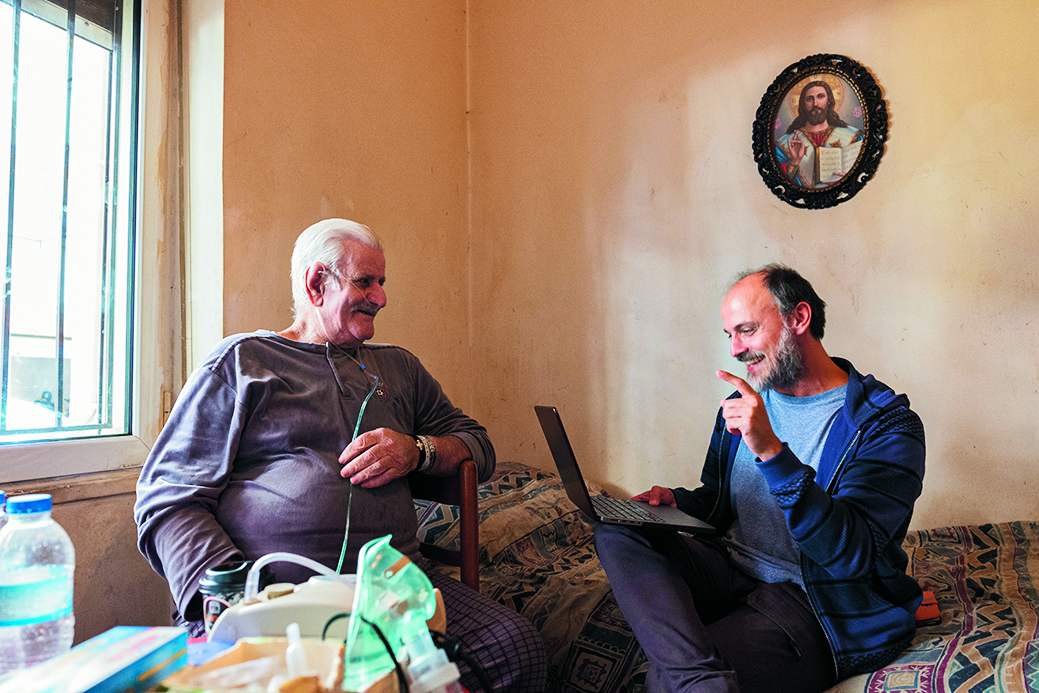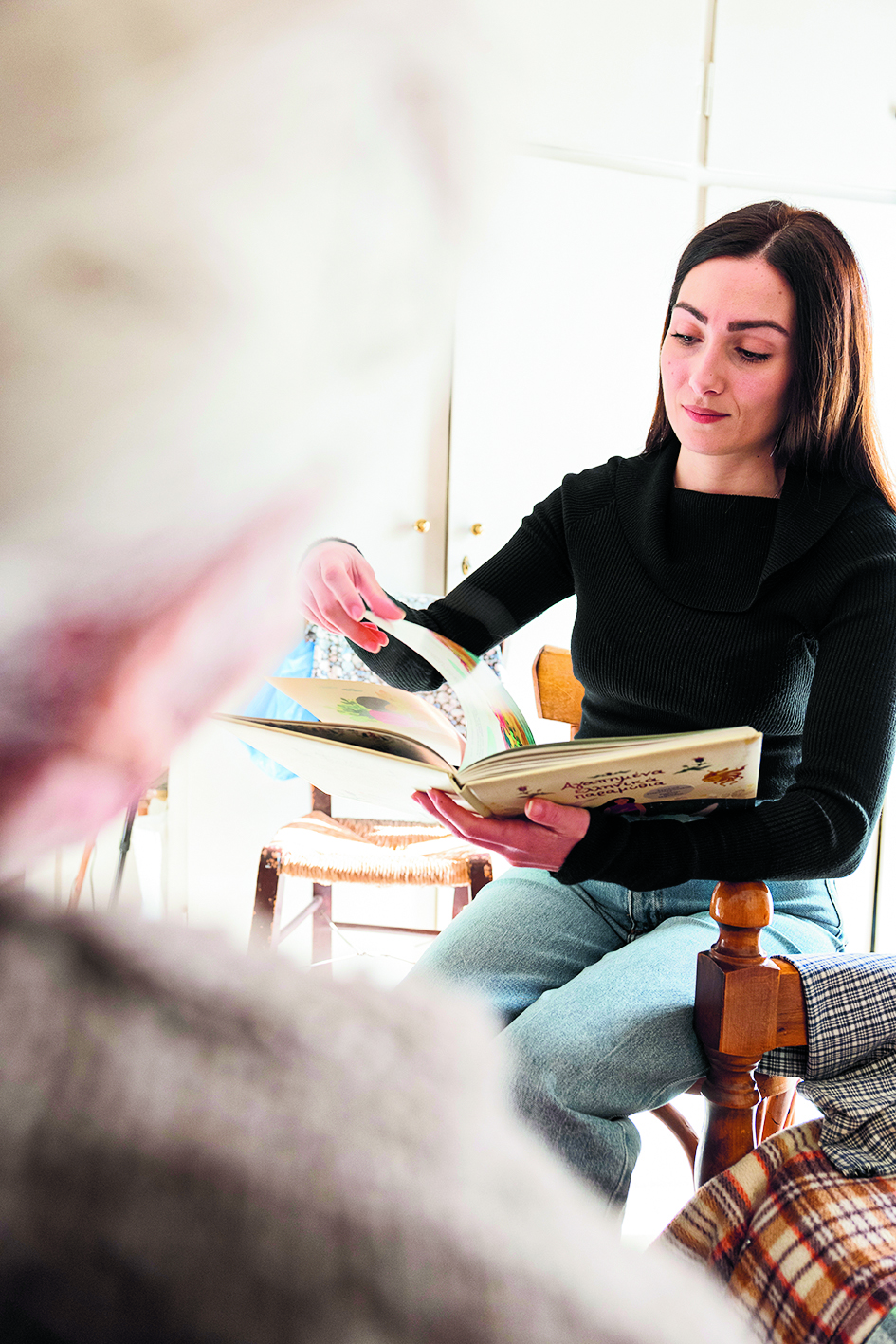Volunteer readers help elderly combat loneliness
Nonprofit organization brings together visually impaired individuals with people who provide entertainment and companionship by reading to them

“How beautiful old Athens used to be!” muses Nikos Boukouras, as he discusses the secrets of the Ilissos River with Aris Lintzerakos, 40 years his junior. In Nikos’ small apartment in the heart of downtown Petralona, where he now lives alone on a disability pension, the pair’s discussions every Thursday range from Athens in the 1980s and 1990s, to model-making, to the Patra Carnival. “This is our time,” says the 25-year-old student, a volunteer for the Therapeutic Reading program set up by the Reading for Others nonprofit organization (Diavazo gia tous Allous).
Reading for Others was founded in 2015 with the aim of recording audiobooks to make them fully accessible to people with visual disabilities. This idea has been embraced by a network of more than 4,000 volunteers who have recorded more than 100 audiobooks.
“Because we believe in the value of inclusion, we wanted to ensure access to reading for elderly people who, for various reasons, cannot read on their own,” Argyro Spyridaki, president and director of the nonprofit organization, tells Kathimerini. The program serves people who live alone or in retirement homes. “Unfortunately, the pandemic and the restrictions imposed on the retirement homes froze the implementation of the program,” she says. In 2023, the program was reactivated with the training of volunteers and the signing of a memorandum of understanding with the Municipality of Athens in September.
“The municipality, thanks to the Help at Home program, has mapped out where the elderly residents live as well as what their needs and desires are, and they were able to recommend people for whom being read to aloud in their homes would be beneficial.” However, potential beneficiaries had many apprehensions. “At first they were reluctant to let us into their home, despite the assurances of the municipality representatives. One woman told us flatly, ‘There is nothing to steal here, I had a gold ring, I gave it away,’” Spyridaki says.
‘At first they were reluctant to let us into their home, despite the assurances of the municipality representatives. One woman told us flatly, “There is nothing to steal here”’
But there are many benefits to this program. They can enjoy reading again, which for some was a daily habit, but “through interaction and dialogue they are strengthened mentally and emotionally.” So what do they want to listen to? “They mainly want detective stories, religious books, or books on history and geography, but also articles from the daily press and even recipes,” Spyridaki says. “We had one special request from an elderly academic who asked for our help to complete his work, as he was suffering from macular degeneration, so the volunteer was asked to read scholarly papers.”
Nikos Boukouras’ acquaintance with Aris began last November, but their bond is already obvious. The retiree’s every sentence ends with the phrase “as Aris knows…” and a tender look at his young interlocutor, to whom he has more or less narrated his entire life. He will be 66 at the end of February, but he suffers from serious health problems, which is why he receives a disability pension. “The loss of his wife is very recent, and this has increased his sense of loneliness,” says Aris, who is volunteering for the first time. “I heard about the activity from a stand-up comedian, Stelios Anatolitis,” he told Kathimerini. “I was at a stage in my life where I wanted to have new experiences.” So he added meetings with Nikos to his weekly schedule, along with studying for his university exams and attending classes at a private journalism school. “I thought it would be more worthwhile to support the elderly, because they are the most underserved population in Greece.”
“It is thanks to these kids that I am holding on to life,” Nikos emphasizes, referring to the members of the Help at Home team, who provide him and his household with multilevel support, and to Aris, who has become his most valuable companion. “I was born in Patra, at 12 o’clock on the night of February 25, when they burned the Carnival King,” Nikos says. “Maybe that’s why I’m so connected to the Patra Carnival – in fact I was on the Carnival Committee for many years.” The last time he was in his hometown was before the Covid-19 pandemic. “But I’m interested in learning how Carnival is celebrated all over Greece, even in places I haven’t had the chance to visit, like Naoussa or Xanthi.” Therefore, February’s readings were be exclusively about the customs related to the “Triodion” (the Orthodox pre-Lenten period). Nikos’ other great love is model-making. “Next time you come, I’ll have the train set up here,” he says.
“I have lived in Petralona since 1974; for many years I had a convenience store in Psyrri, and I have associated the church of Agioi Anargyroi with all the important events in my life – my marriage and the baptism of my child, the loss of my family.” The 66-year-old makes no secret of his love for Athens, which he believes “has lost its shine.” Aris rarely keeps to the 60 minutes allotted for the visit. “When I say, ‘I’ll be leaving soon,’ Nikos comes up with a new story, more exciting than the last one,” the 25-year-old says, laughing. And it is with this smile that he leaves Petralona each time. “I leave emotionally fulfilled and more cognizant of the different reality of a man with whom I live in the same city.”
Folk tales
“And they lived happily ever after. And they gave me some sesame bread rings, and the dog Kountouris ate them.” This is the most common ending of the Cretan folk tales that are read aloud every Tuesday in a ground-floor apartment in the Sepolia area of Athens. Sitting at his window, 77-year-old Konstantinos Amargiotakis waits impatiently for Giorgos Stylianopoulos, a volunteer for the Therapeutic Reading program, to arrive on his bicycle. Their appointment, which they both always observe religiously, is set for 11 a.m. “When we met, I wondered what would move him the most,” says the 47-year-old volunteer. “Since he was born and raised in Crete, I started with books by Nikos Kazantzakis, because I wanted to take him back to his childhood but the subject matter was a bit heavy for him, so we continued with traditional folk tales,” he explains. Giorgos, an actor by profession, reads the text from his laptop, pausing ever so often to ask the 77-year-old the meaning of various words in the local dialect. “What is a ‘mesodoki’? What does the narrator mean by the verb ‘pebo’?” he asks with sincere curiosity, giving Konstantinos the pleasure of introducing him to the local vernacular of the place he left at the age of 14.
Konstantinos, who worked for many years on construction sites, mainly as a blacksmith, retired at the age of 59, but soon developed serious health problems and now lives on respiratory support. As a result, his ventures outside the home have been drastically reduced in recent years. “Reading makes me forget and stop thinking about my hardships,” says the man who began working at the age of 12 and has been widowed twice. Television is his constant companion because he lives alone. “I watch the news and TV dramas,” he says. “My invaluable supporters are the Help at Home group. One takes care of the household chores, another helps me bathe, and I turn to the social worker for any other issue that arises.” The whole neighborhood, however, keeps an eye on him. “I spent a few days in the hospital, and when I came back, everyone came by and asked me: ‘Why was your window closed? We were worried about you!’ Where I come from, they say, ‘If you don’t have a good neighbor, sell the house,’” he jokes.
“The first time I was shocked because I realized how much the people around us need companionship,” Giorgos observes. “In the theater, communication and the effect we have on the other person is indirect, but here the contact is direct.” Every Tuesday at midday, “I go home having taken something away; the whole thing is rewarding.” What the 47-year-old actor, who is training to become a counselor, enjoys most are the vivid descriptions of his elderly Cretan interlocutor: the teenage years in Iraklio, the move to Athens and settlement in the Mesogeia area of Attica, the “legacy” of his father, who was a logger, the hardships of working on the construction of the Galaxidi-Amfissa road, and the physical strain from mixing the cement.







